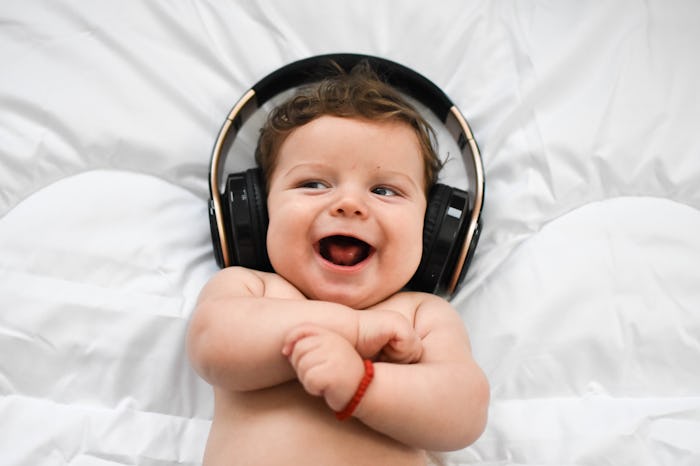News

Your Baby Might Be Trying To Sing Along To That Song You've Been Playing On Repeat
Many parents track how quickly their kids learn to speak, but have you ever wondered when babies start to sing? A recent study found that babies may try to sing along to music as early as 15 months old and it might be the cutest bit of research you'll come across all day.
The small study — which involved following a single toddler around for a day — was led by Lucia Benetti, a doctoral student at the Ohio State University School of Music, and was recently published in the Journal of Research in Music Education. Benetti followed a 15-month-old boy named James for a 16-hour period and documented him making sounds similar to the beginning of the song “Happy Birthday,” just a few hours after he heard it played on a toy. An analysis of the boy's singing found that he was hitting the first six notes of “Happy Birthday” almost perfectly, in G major.
Throughout the study, James wore a tiny recording device in order to capture every sound he heard and made. Benetti and her adviser, Ohio State music professor Eugenia Costa-Giomi, then analyzed the recorded audio data looking for patterns. The team then played the recordings for people who were unaware of the goal behind their research to see what they heard. The listeners reported that James was trying to sing “Happy Birthday.”
“We know that throughout the first year of life babies become sophisticated music listeners — they learn a lot about the patterns of pitches and rhythms in music,” Benetti said of the research on the Ohio State news website. “And infants become better at doing this spontaneously. But we don’t know much about how exactly this happens.”
"Happy Birthday" wasn't the only song that James picked up on. After lunchtime, his mom sang the song "Rain Rain" — as in "Rain, rain, go away, come again some other day," — to him twice. Then six hours later, James was singing the song to his dad during play time, according to Science Daily. He sang it for seven seconds in the key of A-flat major.
This study is one of the first of its kind to measure an infant's musical mimicry, Science Daily notes. And while Benetti called for further research involving a larger pool of infants, she believes that her findings are indicative of infant musical ability. “And what we learned is that in this one case at least, the baby is trying to sing along to songs he’s hearing,” she said.
Even if your little one isn't singing songs back to you verbatim, music can still have a profound impact on their brains. A separate study published in the journal Proceedings of the National Academy of Sciences found that early music lessons and exposure can help children to develop their perceptual skills, even potentially improving their speech, as Medical News Today reported.
What's more, yet another study conducted in 2012 at McMaster University and published in the journal Developmental Science and Annals of the New York Academy of Sciences suggested that babies who participated in music classes with their parents before the age of one “smile more, communicate better and show earlier and more sophisticated brain responses to music.”
Do with these findings what you will, but at my house we'll be celebrating the fact that our toddler really was singing every time we thought that she was. Well, she probably was anyway...
Studies referenced
Lucia Benetti, Eugenia Costa-Giomi. Infant Vocal Imitation of Music. Journal of Research in Music Education, 2019; 67 (4): 381 DOI: 10.1177/0022429419890328
T. Christina Zhao, Patricia K. KuhlProceedings of the National Academy of Sciences. Effects of musical intervention in infancy. May 2016, 113 (19) 5212-5217; DOI: 10.1073/pnas.1603984113
McMaster University. "Babies' brains benefit from music lessons, even before they can walk and talk." ScienceDaily, 9 May 2012.